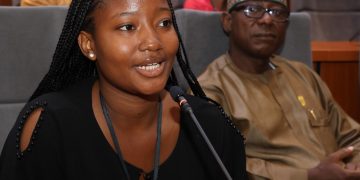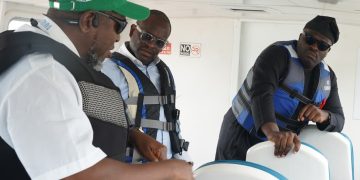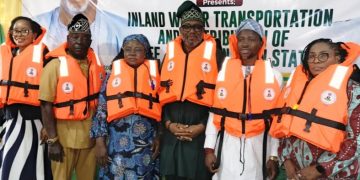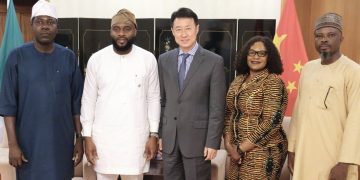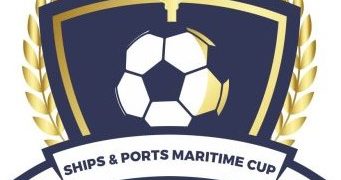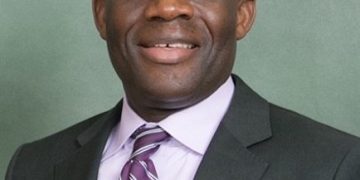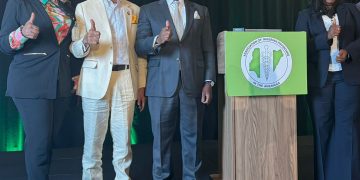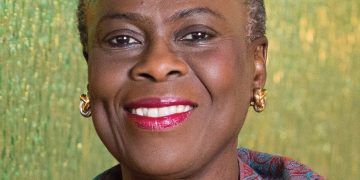- Customs Area Controller, Tin Can Island Port, Compt. Dera Nnadi (right), Managing Director/Chief Executive Officer, NLNG Shipping and Marine Services Limited (NSML), Abdulkadir Ahmed, President, Association of Maritime Journalists of Nigeria (AMJON), Paul Ogbuokiri, and Director of Administration, Nigerian Maritime Administration and Safety Agency, Isichei Osamgbi (representing the Director-General) during the AMJON conference on maritime finance in Lagos…Thursday
By Anthony Nwachukwu
Beside financing and insurance are the “indispensable roles of regulations, standards and competence” in the multifaceted process of vessel acquisition, as the shipping and maritime industry is highly regulated, “with great emphasis on safety, reliability and environmental sustainability.”
This much was stated by the Managing Director/Chief Executive Officer of NLNG Shipping and Marine Services Limited (NSML), Abdulkadir Ahmed, in his keynote address at the Association of Maritime Journalists of Nigeria (AMJON) conference on Maritime Finance in Lagos Thursday.
Based on the theme, “Vessel Acquisition/Construction: Nigerian Banks, Insurance Firms, Government and the Blue Economy”, Ahmed noted that financial institutions play key roles in the acquisition, construction and operations of vessels globally, regretting though that Nigerian banks are too weak to shoulder the huge capital required.
Citing the Petrofin Index for Global Ship Finance, Ahmed noted that “the top 40 banks’ lending to shipping in 2023 was $284.27 billion; the total global bank lending, including local banks, approached $375 billion, while a cautious and indicative figure for global ship finance, including all forms of lending – leasing, export finance and alternative providers – is approximately $600 billion.”
The regulations include the International Maritime Organisation’s conventions, regulations and guidelines for safety, like the Safety of Life at Sea (SOLAS), Maritime Pollution (MARPOL) convention, and the many new rules on decarbonisation and reduction of greenhouse gas (GHG) emissions to combat climate change threats.
To acquire vessels, therefore, one must be mindful that “the landscape of maritime regulations, and by extension the standards, is becoming more and more stringent, with resultant impact on design and operations of both new and existing assets,” Ahmed said.
“From a financing perspective, major financiers and insurance companies of ships globally have signed up to the Poseidon Principles – a global framework for integrating climate considerations into lending decisions to promote international shipping’s decarbonisation.
“The principles are consistent with the policies and ambitions of the IMO to reach net zero emissions in the maritime industry by 2050, compared to 2008 levels. Currently, 34 financial institutions are signatories to the Poseidon Principles, representing a bank loan portfolio of global shipping of 80 per cent of the global ship finance portfolio.
“The Poseidon Principles for marine insurance recognise the role insurers play in the shipping industry and promote responsible environmental stewardship throughout the maritime value chain.
“These principles enable insurers to assess and disclose their portfolios with responsible environmental impacts and incentivise international shipping’s decarbonisation – aimed at supporting a better future for the shipping industry and the society.”
Against this backdrop, Nigerian ship owners have to understand how the drive for decarbonisation and net zero emission objectives exert a huge impact on ship finance and insurance in the maritime industry, he stated.
Also, “the need to have fully compliant vessels trading internationally is of paramount importance and all stakeholders must understand the ever-changing dynamics to ensure compliance right from the point of conceptualising the acquisition or construction of the vessels.
“Shipping is a hugely capital-intensive activity, and accessing financing is key for acquisition and construction activities. To that end, owners and prospective players need to ensure a proper understanding of the dynamics that lead to success in the constantly evolving maritime sector and ensure compliance at all cost, as there are no ‘short-cuts’ to compliance.
“Strict compliance with standards will ensure that ships are not only built and operated to the highest quality and safety standards but are also able to trade both locally and internationally.”
Similar to regulations and vessel standards is the role of technical competence and expertise in ship acquisition and construction as “the complexity of the modern vessels, with the raft of advanced technology features, demand a high level of skill and knowledge right from the design and acquisition phase up to their operation.
“Augmented reality, artificial intelligence, autonomous operations and big data are becoming part of maritime operations,” whereas Maritime Education and Training (MET) institutes traditionally cater to the requirements of the STCW regulations when developing curricula, focusing on the delivery of IMO model courses, he stated.
The STCW Convention and Code (as amended) sets out the current international benchmark for the training and education of seafarers, with the 2010 Manila amendments marking a major revision aimed at bringing the convention and code up to date with recent and foreseeable developments.
However, he noted that the pace of operational and technological advances in maritime operations continues to accelerate, even as ships become sophisticated sensor hubs and data generators, and ship and shore now digitally interacting in real time.
Therefore, “while compliance with STCW standards is essential, the industry’s diverse stakeholders need maritime education and training that aligns with these ongoing technological changes and raises the industry’s capital productivity. Changing technology and customer expectations require a MET course correction.
“Traditional curriculum design influenced by the technological integration needs to reflect, and be inspired by the ongoing innovation in the industry. The use of simulators in maritime education and training, for instance, has been an essential component for developing seafarer skills and competencies for decades.
“Emerging immersive technologies, such as virtual reality (VR) and augmented reality (AR), create new and exciting possibilities for maritime training to upskill the maritime practitioners in the industry. There must be a conscious effort to ensure the personnel saddled with handling multi-million dollar assets are adequately trained and upskilled to properly operate and manage these assets.
“Training and certification provided by institutions recognised by classification societies ensure that the individuals handling acquisitions or new-build activities are well versed with the requisite standards and leading practices. We should note that competence is what transforms a good acquisition into an excellent one.”
According to him, NSML has been at the vanguard of driving compliance with standards and the regular training and development of personnel to future-proof them in the ever-dynamic maritime industry, while clients’ vessels are maintained to the highest standards globally to keep them “seaworthy, cargo-worthy and globally tradeable.
“By so doing, we ensure that the owners enjoy a good return on investment (ROI), which is important to ensure the repayment of their loans. Therefore, while finance and insurance are basic in global maritime industry, “these must be predicated on adherence to standards, as well as the deployment of skilled and competent professionals.
“An integrative approach comprising finance, standards and competence will create a robust framework capable of ensuring success in our shipping acquisition and new-building activities.
“By adopting a holistic approach that goes beyond financing, we set ourselves on a course for sustainable growth, safety and operational excellence, in line with our strategy of ‘Be Safe, Be Reliable, Create Value,’ which is key to the overall success of the Nigerian maritime industry.”

